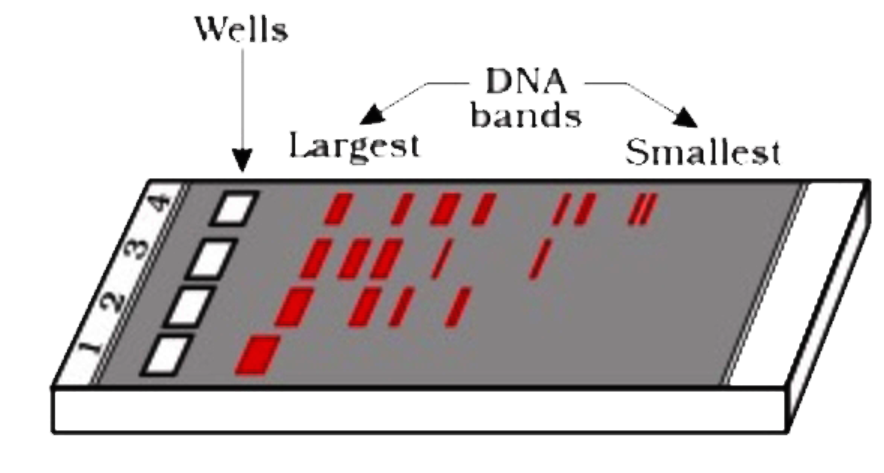Read the following statements regarding agarose gel electrophoresis and select the CORRECT ones.
I. The longest DNA fragments are nearest to the anode.
II. The matrix of the gel is a natural polymer obtained from seaweeds.
III The process is used to check the progression of restriction enzyme digestion.
IV. The fragments of DNA separated due to the sieving effect provided by agarose gel.
I, II III and IV
III and IV only
II, III and IV only
I, II and III only
The correct Answer is:C
To solve the question regarding agarose gel electrophoresis, we will analyze each statement one by one to determine which ones are correct.
1. Statement I: The longest DNA fragments are nearest to the anode.
- This statement is incorrect. In agarose gel electrophoresis, DNA fragments are negatively charged and move towards the anode (positive electrode). The longest DNA fragments move the slowest because they get entangled in the gel matrix, while the shortest fragments move the fastest and are nearest to the anode.
2. Statement II: The matrix of the gel is a natural polymer obtained from seaweeds.
- This statement is correct. Agarose, the gel used in electrophoresis, is a natural polymer derived from seaweed. It is a polysaccharide that forms a gel-like matrix when dissolved in buffer and cooled.
3. Statement III: The process is used to check the progression of restriction enzyme digestion.
- This statement is correct. Agarose gel electrophoresis is commonly used to analyze DNA fragments after they have been cut by restriction enzymes. By running the digested DNA on a gel, one can visualize the sizes of the resulting fragments and confirm whether the digestion has occurred.
4. Statement IV: The fragments of DNA separated due to the sieving effect provided by agarose gel.
- This statement is correct. The agarose gel acts as a sieve, allowing smaller DNA fragments to move through the gel more easily than larger fragments. This sieving effect is what enables the separation of DNA fragments based on size.
Conclusion:
The correct statements are:
- Statement II: Correct
- Statement III: Correct
- Statement IV: Correct
Thus, the correct option includes statements II, III, and IV.
Final Answer:
The correct statements are II, III, and IV.
---
- This statement is incorrect. In agarose gel electrophoresis, DNA fragments are negatively charged and move towards the anode (positive electrode). The longest DNA fragments move the slowest because they get entangled in the gel matrix, while the shortest fragments move the fastest and are nearest to the anode.
- This statement is correct. Agarose, the gel used in electrophoresis, is a natural polymer derived from seaweed. It is a polysaccharide that forms a gel-like matrix when dissolved in buffer and cooled.
- This statement is correct. Agarose gel electrophoresis is commonly used to analyze DNA fragments after they have been cut by restriction enzymes. By running the digested DNA on a gel, one can visualize the sizes of the resulting fragments and confirm whether the digestion has occurred.
- This statement is correct. The agarose gel acts as a sieve, allowing smaller DNA fragments to move through the gel more easily than larger fragments. This sieving effect is what enables the separation of DNA fragments based on size.
The correct statements are:
- Statement II: Correct
- Statement III: Correct
- Statement IV: Correct
The correct statements are II, III, and IV.
Topper's Solved these Questions
Similar Questions
Knowledge Check
In agarose gel electrophoresis–
ADNA migrates towards negative electrodeBLarger molecules migrate faster than smaller moleculesCEthidium bromide can be used to visualize the DNA fragmentsDPink coloured bands of DNA can be visualized when gel exposed to UV lightSeparation of DNA fragments using agarose gel electrophoresis occurs due to:
ADifference in the sequence of the fragmentsBPresence of different charges on the fragments.CDifference in the staining properties of the fragments.DDifference in the sizes of the fragments.Gel electrophoresis is employed in .
I. Separation of DNA fragmetns .
II. Selection of DNA fragments .
III. Vissualizing DNA
IV. Check the progression of restriction enzyme digestion.AI & IIBII&IIICIII &IVDI &IV
Given diagram showing a typical agarose gel electrophoresis showing migration of DNA fragments . The undigested DNA fragment will be present in the lane

View SolutionWhat would you use to separate DNA fragments in gel electrophoreis ?
View SolutionAssertion: The DNA fragments can be separated by a technique known as Gel electrophorosis
Reason :The fragments separates according to their shape through the sieving effect provided by agarose gel
View SolutionIn agarose gel electrophoresis, DNA molecules are separated on the basiS of their
View SolutionIn agarose gel electrophoresis, DNA molecules are separated on the basic of their
View Solution
